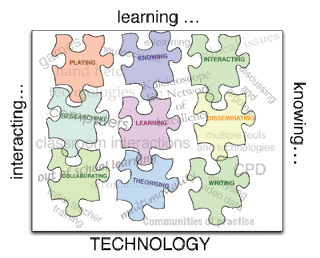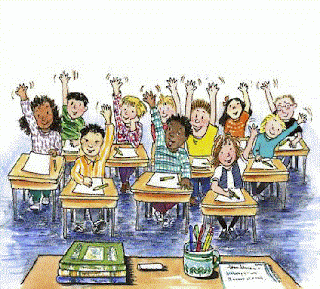Love, Love, Love This Assignment! I read all three of his blogs, but I thought it would be fun to blog about what he's learned about from year one to year three - the greatest span.
Mr. Joe McClung
After reading Mr. McClung's blog on Wednesday, May 27, 2009, I was reminded of my first year teaching. I think he was extremely insightful, and I would also like to point out that every aspect he talked about involved building better relationships.
"I fell like that this year I have developed immensely in regards to this aspect of teaching. In order to be effective you have to be able to let your audience drive your instruction." - Joe McClung, At the Teacher's Desk
He quickly realized like most teachers that once you are in the classroom all alone that you are no longer in search of your grade - it is your job to become the evaluator. How do we do this? Make student-centered lessons. What else? Consistently check that our students are comprehending the material.
How does this relate to building better relationships?
Take a look at our group project Part 1 and Part 2 reflecting Rafe Esquith's book Teach Like Your Hair's on Fire. In our reflection for our project, we discuss building a better relationship with our students and designing lessons that appeal to our students. It is one way of building trust with our students without using fear tactics.
There's no point of being scared of doing this. Sure, we'll have the occasional administrator come and visit your classroom. Stop trying to impress with your knowledge. Get down on the students' level and relate the information to THEM!
Mr. McClung also discussed the importance of being flexible. I taught for four years - it took me two years to become more flexible in the classroom and in the school. I am afraid that I am still not very flexible at home.
"While I always plan to have that elusive perfect lesson, I don't let it get to me and I do not kill myself over my mistakes any more. When things go wrong, simply work with it and try to better the situation.....and make sure you do it with a smile on your face!" -Joe McClung, At the Teacher's Desk
Flexibility is important for two reasons:
1. The classroom is never going to be perfect, lessons will never be perfect, students will never be perfect, teachers will never be perfect. There is going to be things that you can't avoid. While structure is a great thing and helps build a better learning environment, there has to be room for change to better the learning environment. You have to plan, but you should also plan to allow time for things that may occur unexpectedly.
2. If you can't be flexible, then your learning environment will not be a fun place to learn and your job won't be fun. I learned that when I taught, and I am constantly reminding myself that at home.
How does this relate to building better relationships?
Like Mr. Esquith said in his book, his classroom was often a refuge for his students for a number of reasons. YOU WANT THAT! Your students will come into your classroom feeling safe. Your students will come to you for advice. Your students will come to you for help. Your students will feel comfortable with you, if they feel like you CAN work with them. Never make them feel like an option. Like your own biological children, they will become a priority (without you even realizing it. I have students to this day that email me, call me, and message me on Facebook, because they feel like they can. They feel like I have time for them. They won't ever interrupt my schedule - I took on that responsibility when they walked into my classroom. It feels amazing.
Bettering communication and listening to your students were also topics Mr. McClung said were key to having a successful first year of teaching - this is also true for life.
"I know that sounds obvious, but communication is one of the hardest skills to develop, so practice all you can and build those strong relationships with teachers and students." -Joe McClung, At the Teacher's Desk
Improving communication between other teachers and students is very important to your first year of teaching. Until this point in your teaching career, you are often only thinking about yourself, your papers, your presentations, your grades, etc. Now you must change your mentality. Do you listen to your peers? Maybe not. Now is the time. These people are no longer just your peers - they are the people you work in close contact with daily. They are the students that you teach daily - it's also your job to listen-up for questions, concerns, and problems going on in their life. If you don't really listen to your co-workers and students, you might miss out on that last-minute faculty meeting after work, the fact that John-Boy's mother just got diagnosed with Stage 4 Breast Cancer, or that much need adult beverage to celebrate good scores on this semester's CRT's.
You should also be open to the idea of suggestion - just always remember that people being critical should be positive and constructive. It's also okay for you to let them know when you are offended. It's called COMMUNICATION!
How does this relate to building better relationships?
If people know that you are willing to listen and willing to take criticism, then they will feel like they can come to you in need! I think this is the building block of ALL relationships.
What do you think?
Another topic discussed in Mr. McClung's blog is being reasonable, and I think this is probably the thing that most first year teacher's over-look. We all have or all will come in on the first day and expect our students to be in their seats, books out, paper ready, pencils in hand, and two dozen apples on our desk to welcome us. We also have or will expect them to do ALL their homework that we assigned. Guess what? You are FRESH MEAT. They knew you were coming, and it's very possible (with technology) that they have done their research on the latest addition to the faculty. It happened to me - it actually stemmed from me getting a head coaching position at a very prestigious 6A high school in Birmingham, Alabama, but it led to them finding out more information about me as a teacher. I am serious. Go in our your first day with reasonable expectations and maintain those expectations throughout your career. It's okay to set the bar high, but you should not set it somewhere on Mars. They are students!
"While its fine to have lofty goals for our students, we set our students up for disappointment when a goal is not met and we scold them for not coming through."
-Joe McClung, At the Teacher's Desk
What to expect, when teaching for the first time:
1. They will not all be in there seats.
2. Most will not have all their supplies.
3. You might get one or two apples a year - you may or may not want to eat those apples.
4. Homework will not always be turned in! - After reading Should Teacher's Assign Homework and with some classroom knowledge, I have decided that teaching my students personal responsibility and time management, will be one of my greatest priorities when I return to teaching.
One of the best ways to establish REASON in your classroom and let your students know that you are reasonable, is by allowing them to help you create a set of classroom rules on the first day of class. It not only shows that you are reasonable but that you respect their opinions. Just make sure you set ground rules for this activity! I am still figuring out how I am going to incorporate my new time management goals and personal responsibility into this activity.
Apply this logic to every aspect of your classroom: the way YOU present a lesson, the answer to your STUDENTS' answer to essay question #3, and when Mr. New Teacher 2013 floats into your room for third block.
How does this relate to building better relationships?
Duh, do you want to have a relationship with a unreasonable person?
Last but not least, a fear of technology and continuous education are important to first year teachers. I think not being a afraid of technology and being life-long learners are part of building a better relationship with ourselves. It's also key to building better relationships with our co-workers and students. It can open so many doors:
"It's never too late to change your way of thinking, learning, or style. We do everything short of beg students to learn on a daily basis, but sadly some of us refuse to learn and grow as professional educators. We work in a learning environment, so why not soak up as much as you can? We owe it to our students." - Joe McClung, At the Teacher's Desk
1. It should be a commitment to ourselves to make ourselves the best teachers that we can be! Learning the latest technology, using the latest technology, and a desire to know more will put you on one one of the highest levels as a teacher. We can learn in so many different ways. We have discussed building our PLN's. The information is there. Why don't we use it? Make those relationships with others like us and beyond.
2. Being abreast of the latest technology and information can help you be a better vessel of knowledge with co-workers and maybe establish new relationships. Help each other! Share your knowledge.
3. Students? They will try to stump you, and they will succeed. Beat them to the punch. No more. They will respect you more! Respect is the foundation of any teacher/student relationship.
How does this relate to building better relationships?
It is building relationships!
Three years later...
After reading Mr. McClung's blog, Thursday, June 23, 2011: What I Learned this Year, I thought back to my third year teaching. I had many of his same thoughts. Throughout most of first and second years of teaching, we often still have the mentality of trying to please our college professors, parents, school teachers and coaches. It takes us a little while to realize that there are now people trying to please us! Several of the issues Mr. McClung discussed dealt with knowing our place as a new teacher and how various interruptions can cause a less than desirable learning environment for our students. I wish I would have had this kind of reflection as a new teacher.
First, I would like to discuss the problem of too many bosses.
"As a teacher I find myself doing quite a bit of people pleasing on a daily basis...however, the major issue with this is that it becomes very easy to get wrapped up in what people think of you. If you are not careful you can become completely consume with trying to please some many individuals that sometimes your own students get left out of the picture." -Joe McClung, From the Teacher's Desk
We are no longer graded by our professors, we have been out of high school for a long time, we know our parents will always love us despite our mistakes, and recreational sports really are for fun now! The only people we report to now are our school board, our principals, our department heads, and most importantly we report to our students! We shouldn't be bothered about what Miss Biology has to say about our explanation of where Einstein was on the day he developed the Theory of General Relativity in World History class. We also shouldn't concern ourselves with Mrs. Computer Science's latest date with Mr.P.E. If we concern ourselves with those that our not our superiors, then we forget forget what's most important...the students. They should always be our first priority!
"Our decision making process should always be student centered and not centered around pleasing adults." Joe McClung, From the Teacher's Desk
These teachers that care too much about personal lives and staying in the business of other teachers are often the source of barriers built by teachers that are in the profession of TEACHING! Mr. McClung also cited this as a problem for newer teachers. I never let these people get in the way of my optimistic attitude. Nobody should. It could stifle your excitement. If our students see the excitement we have for change, new programs, and learning, then they will also be excited. This will create a better learning environment for the students - the reason we entered this profession. This usually goes hand and hand with being somewhat of an outsider.
Being an outsider is okay! You won't be the teacher that sits in the back of the room during professional development days wishing you were laying by the pool, you won't be the teacher that comes in and shows a unrelated movie because you don't feel like teaching, you won't be the teacher that stands up and lectures for almost two hours to each class. You'll be the teacher that is excited to learn new things. You'll be the teacher that brings in new science experiments for your class. You'll be the teacher that engages your students to discuss instead of you only talking. Kids will come to your room ready to learn. Kids will want to be in your room. Kids will look forward to the next day in your class. You'll be the light in their day. You'll make a difference.
"This year I have really been fearful of turning into a teacher that has become very comfortable to the point of coasting through their daily work. I began to pick up new tasks that would challenge me and prevent me from developing routines."
-Joe McClung,From the Teacher's Desk
Most importantly, Mr. McClung discussed the importance of not becoming comfortable in your role as a teacher. This is true for every profession. I coached Junior Varsity Volleyball, Varsity Softball, and I was the Model United Nations coordinator. I also taught Remediation for the AHSGE:Social Studies. My extra involvement kept me busy as a teacher, and the coaching positions were permanent from year to year - it didn't leave a lot of room for much else. I always looked for little extras (i.e. Prom Chaperone, Selling programs or tickets at football games, Walking/Helping coordinate Relay for Life, etc.). I have ADHD something fierce. I get tired of the same routine, and it makes me get lazy. I have known this since I was in third grade. It's important as a teacher. It keeps us on our toes, and it makes the students know we care.
I plan to use some of Mr.McClung's suggestions and continue the ones I already used! He's full of knowledge and wisdom. PLN?
We also have to remember to STAY POSITIVE!










Lindsay, you made some great points and I can tell that this time, when you rejoin the teaching field you will be taking all of the information that we have learned with you! We all will, but I guess since you have been here before, you know exactly what you need to make you better and we are all just kind of going with the flow.
ReplyDeleteMr. McClung was very inspiring! It is always good to read about someone else's first time experiences, especially when you are anxiously awaiting your own first time experience of the same kind.
I enjoyed reading your comments about how being an outsider is okay! I didn't read his third blog so I was glad to be able to read about that. Very encouraging!
I believe the most important lesson that Mr. McClung shares is to stay positive.
Good Post!!! Very informative.
Despite what most people claim, your first year is FUN! I hope I portrayed that somewhat...;-)
ReplyDeleteHey Lindsay,
ReplyDeleteBack yet again, and wow. This is probably the best student response post to Mr. McClung that I've ever seen. Seriously. Not only is it expansive, but you cover a lot of ground and make some great points in conjunction with Mr. McClung. Great job. If I had gold stars, you'd get five.
Thank You. This is actually the blog I have chosen to put in my iBook. This was one of my most favorite assignments.
ReplyDelete